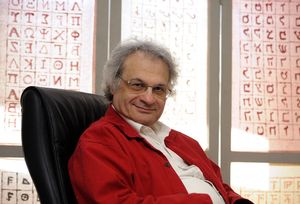Fisk on Amin Maalouf
Interesting article by Robert Fisk in The Independent this morning, on the election of Lebanese-French author Amin Maalouf to the Acedémie Française. I do remember the latter’s first book — a novelized life of the great Maghrebi historian El Hasan ben Muhammed el-Wazzan-ez-Zayyati, better known by his pope-imposed name Leo Africanus — as a very enjoyable summer “fiction” read. I agree with Fisk that Maalouf’s best book is his non-fiction account of the Crusades as seen through Arab eyes. Fisk is rightly critical of Maalouf’s political stance — check it out. Opening paragraphs below; full article here. If memory serves, he would be the second Arab elected to the French Académie, the first being the Algerian novelist Assia Djebar.
The immortality of a great, if flawed, historian
How many of the Nato admirals fighting the beast of Tripoli realise the origin of their title?
“Admiral” comes from the French amiral, which comes from the Arabic amir al-bahr which means “Master of the Sea”. Our own “First Sea Lord” captures the original rather well. Then there’s the Spanish hero El Cid which comes from the Arabic el-sayed (“the Lord”). We eat lemon sorbet which comes from the Arabic charbat. We lie down on a mattress which originates with the Arabic matrah. And so on.
Amin Maalouf is promising an extensive study of etymology when, as a new member of the “Immortals” – he has just been elected to the Académie Française in Paris – he puts his Arab-European culture to good use at its Thursday meetings. If the French have banned the burka, they might as well know that matraque (truncheon) comes from the Arabic matraq. Maalouf is better known in France than Britain, although many will have admired his wonderful novels, among them The Rock of Tanios, a grim, painfully accurate account of sectarian life in Lebanon’s Chouf mountains and colonial interference in the Levant.
However, I believe his finest work is The Crusades Through Arab Eyes, a non-fiction account of the first “war of civilisation” drawn mostly from Arab rather than European documents. It revealed how the starving knights of Christendom ate their dead Muslim victims near the Syrian city of Homs. Even Assad’s lads haven’t quite resorted to this.
Now Maalouf returns with more non-fiction, Disordered World, Setting a Course for the 21st Century, and I fear for his reputation. The New York Times puffed him as “the clear, calm, cogent and persuasive voice from the Arab world that the West has been waiting for”. Well, not quite. Maalouf, a Maronite Christian who has spent the past 30 years in self-imposed exile in Paris, admits that “I am not a specialist on the Muslim world, still less an Islamic scholar”.
(ctd here.)



 Poasis II: Selected Poems 2000-2024
Poasis II: Selected Poems 2000-2024 “Todesguge/Deathfugue”
“Todesguge/Deathfugue” “Interglacial Narrows (Poems 1915-2021)”
“Interglacial Narrows (Poems 1915-2021)” “Always the Many, Never the One: Conversations In-between, with Florent Toniello”
“Always the Many, Never the One: Conversations In-between, with Florent Toniello” “Conversations in the Pyrenees”
“Conversations in the Pyrenees” “A Voice Full of Cities: The Collected Essays of Robert Kelly.” Edited by Pierre Joris & Peter Cockelbergh
“A Voice Full of Cities: The Collected Essays of Robert Kelly.” Edited by Pierre Joris & Peter Cockelbergh “An American Suite” (Poems) —Inpatient Press
“An American Suite” (Poems) —Inpatient Press “Arabia (not so) Deserta” : Essays on Maghrebi & Mashreqi Writing & Culture
“Arabia (not so) Deserta” : Essays on Maghrebi & Mashreqi Writing & Culture “Barzakh” (Poems 2000-2012)
“Barzakh” (Poems 2000-2012) “Fox-trails, -tales & -trots”
“Fox-trails, -tales & -trots” “The Agony of I.B.” — A play. Editions PHI & TNL 2016
“The Agony of I.B.” — A play. Editions PHI & TNL 2016 “The Book of U / Le livre des cormorans”
“The Book of U / Le livre des cormorans” “Memory Rose Into Threshold Speech: The Collected Earlier Poetry of Paul Celan”
“Memory Rose Into Threshold Speech: The Collected Earlier Poetry of Paul Celan” “Paul Celan, Microliths They Are, Little Stones”
“Paul Celan, Microliths They Are, Little Stones” “Paul Celan: Breathturn into Timestead-The Collected Later Poetry.” Translated & with commentary by Pierre Joris. Farrar, Straus & Giroux
“Paul Celan: Breathturn into Timestead-The Collected Later Poetry.” Translated & with commentary by Pierre Joris. Farrar, Straus & Giroux